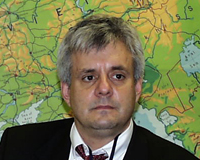![]()

“The Dynamics of International Terrorism”
For some students, summer session is traditionally a time for “lighter” coursework. But since the events of September 11, a course taught by political science professor and terrorism expert John Munro has students filling up the classroom and poring through books like Holy War, Inc. and Who Becomes a Terrorist and Why in an effort to better understand what has become the most important topic of our times.
Munro teaches “Dynamics of International Terrorism: National Policy Responses and Evolving Challenges.” He originally conceived the course to focus on domestic terror like the Oklahoma City bombing and the growth of para-military groups in the U.S. However, after September 11, Munro changed the format so that his students many of who plan careers in politics, national security, law enforcement, or sociology could focus on the international picture and how global terrorism is affecting American political institutions and everyday life.
He recently retired from Oak Ridge National Laboratory (ORNL) where he was a policy analyst focusing on environmental, nuclear waste and energy issues. His interest in terrorism began several years ago while working for ORNL on the demilitarization of chemical weapons. “I saw containers of extremely dangerous chemicals that were stored in locations that could be vulnerable to terrorist attack,” says Munro. “I was amazed that weapons with such a lethal potential were so poorly protected in some cases.”
Munro’s goal is to take students beyond the current war to the primary historical, political and economic causes of terrorism around the globe, and how the U.S. is rushing to adapt to this new breed of conflict. “Cold War era organizational compartmentalization and separation of the FBI, CIA and NSA helped to deter spying against us as we fight this new enemy. We’re in a mode of prevention and detection that requires analyzing and understanding information more quickly and getting it to the decision makers in real time. The problem now is not a lack of information, but the capacity to analyze and interpret data so that it is useful for intelligence purposes.”
An important facet of the class is being sure not to stereotype entire cultures based on a small minority, but also seeing the world from a different point of view.
“It’s my hope that young people will take from this class the knowledge of why terrorism happens and perhaps a better perspective on creative ways to help alleviate its causes,” says Munro. “The last thing we need is a never-ending series of wars that expend our youth and our natural resources. Education, critical minds are our Nation’s best defense against both terrorism and the potential of excesses in our war against terrorists.”
